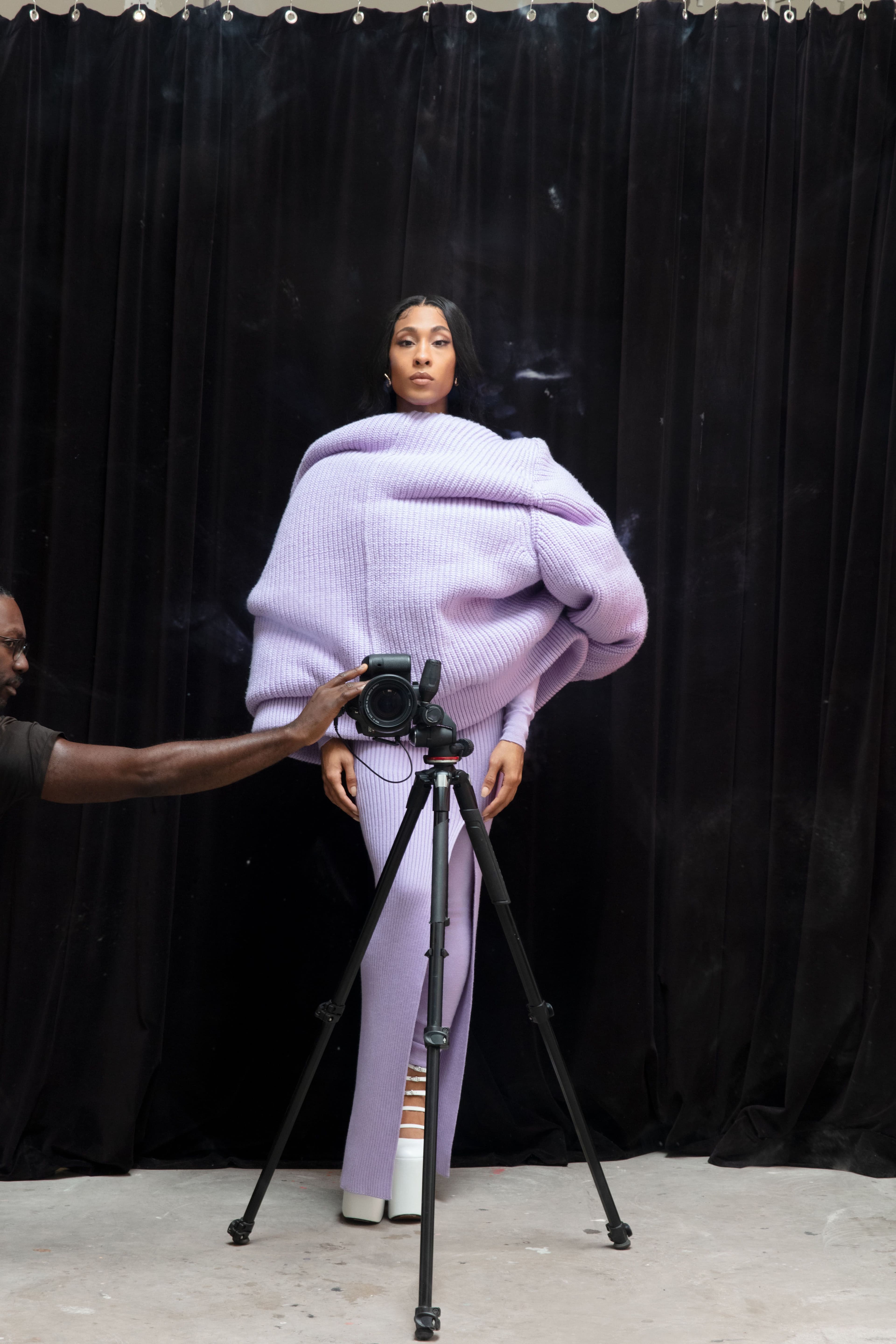
All clothing and boots by Marc Jacobs. All jewelry throughout by Tabayer.
Michaela Jaé Rodriguez Is Doing It for the Girls
At only thirty-one years old, Michaela Jaé Rodriguez, the Golden Globe-winning and Emmy-nominated star of Pose, is at the horizon of her promising, multi-genre career. After three seasons on the groundbreaking series that introduced LGBTQ+ stories from the ballroom community to the mainstream, she currently stars alongside Maya Rudolph in the hit Apple TV+ comedy Loot, which has been renewed for a second season, and recently had a supporting role in Lin-Manuel Miranda’s critically acclaimed film adaptation of the musical tick, tick...BOOM! opposite Andrew Garfield. A classically trained actor and singer, Rodriguez is proving that her breakout success wasn’t an accident—her drive, talent, and commitment to representing her communities accurately and tenderly make her a rising star.
Rodriguez radiated warmth from the moment we met at the Governor’s Island ferry terminal at the southern tip of Manhattan in July. We were headed to brunch at Gitano Island, the new outdoor New York offshoot of the popular Tulum restaurant. She was attentive and generous throughout our time together, despite all of the fans who came up to her. We’d only just sat down for spicy margaritas when a fan from Arkansas approached not just for a photo but to share the impact Pose had on her and her community. “She said it was almost like the Black experience,“ Rodriguez said afterwards. “I’m like, ’No, it is the Black experience.’“
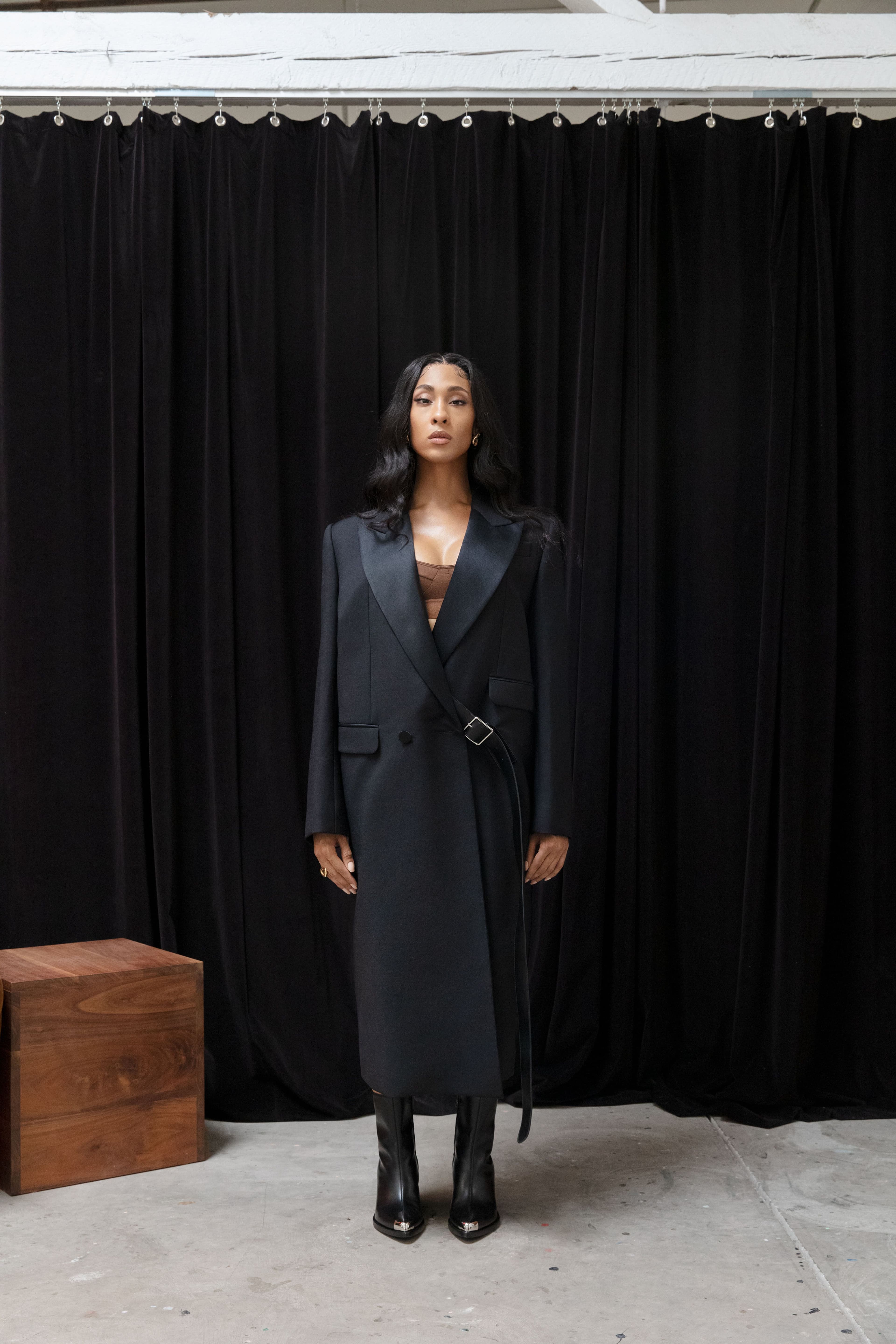
Coat and boots by Alexander McQueen. Bra by Baserange.
Pose, set in the eighties and early nineties in New York, offered fictional storylines of runaway teens, survival sex work, and the devastating impact of the AIDS epidemic, all rooted in the real-life experiences of many in the LGBTQ+ community. Rodriguez starred as Blanca, mother of the fictional ballroom House of Evangelista, a role that brought out her maternal instincts as she supported her house children, all of them living together under one roof as a chosen family.
During the show’s run, which ended last year, a friend told Rodriguez that as Blanca, she presented the experience of a mother and a Black woman. “I’m like, ’Well, that’s [based on] my biological mother,’“ the actor says. “She was the one that institutionalized all of those cultured, maternal emotions inside of me, so that’s the only way I know how to emote. That’s the only way I know how to connect with human beings.“
Rodriguez grew up in New Jersey with her mother, Audrey, who supported her early on in her career and gender transition. “Thank god I had a mother who understood the community that was not shunning or anything. She understood,“ she says, noting that Audrey used to make dresses for people walking ballroom categories as part of the House of Labeija, a legendary ballroom house founded in the seventies that still exists today. “She had friends who died from AIDS, she had friends who were trans, but at that time, there was no vocabulary for it,“ Rodriguez adds. “I had my mother, and I had my trans sisters who were both raising me in so many different ways.“
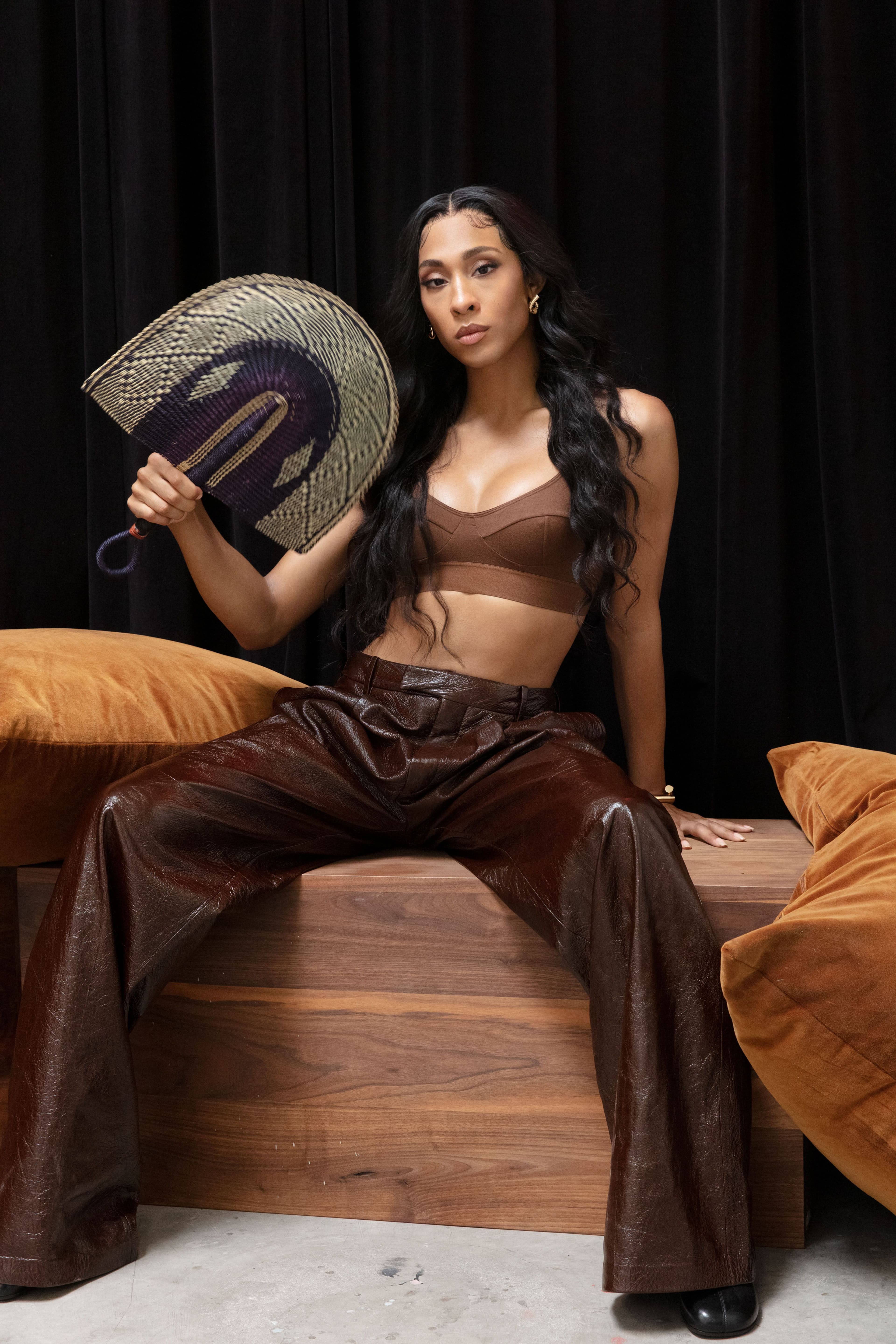
Bra by Baserange. Pants by Gucci. Boots by Burberry.
Having a supportive family and community of trans sisters, many of whom are also in the entertainment industry, primed Rodriguez to enter Hollywood as her full self. As an actor playing a trans character in her breakout role on Pose, she was somewhat frustrated to find that her gender identity became the focal point for her newfound fame. “I don’t want this to be the logline of my life because it’s not,“ she says, “but I also knew that it was a tactic in the media because that’s what the media does in order for them to understand human beings and how they move and how they identify. At that point, I was like, ’Alright, well, let’s see how this goes. I have my tactics too. I have my agendas too for my community.’“
After the final season of Pose, Rodriguez was nominated for an Emmy for outstanding lead actress in a drama series, making her the first openly trans woman to receive the honor, one that required a concerted and grueling campaign to achieve. “When the third season came, I had a fire lit under me. I was like, ’No more will I be sitting here idle and not campaigning for myself and fighting for myself,’“ she recalls. “People need to not only see me, but they need to see the girls who are inside of me and the girls who have passed on, the ancestors who wanted this.“
While she did not win in her Emmy category, she received the Golden Globe Award earlier this year for best actress in a drama television series, becoming the first trans actor to do so. “I didn’t need a win. I’m not a girl who craves for the win,“ she recalls of her loss at the Emmys. Instead, she says, the exposure from being nominated has now changed the dynamics for future nominations and eventual triumphs. “I’m going to win an Emmy next year. I see it coming now,“ she adds, confident in her success and the path she is paving for other girls like her. “I’ll keep supplying, that’s all that matters. I’m going to keep giving the work that my girls need.
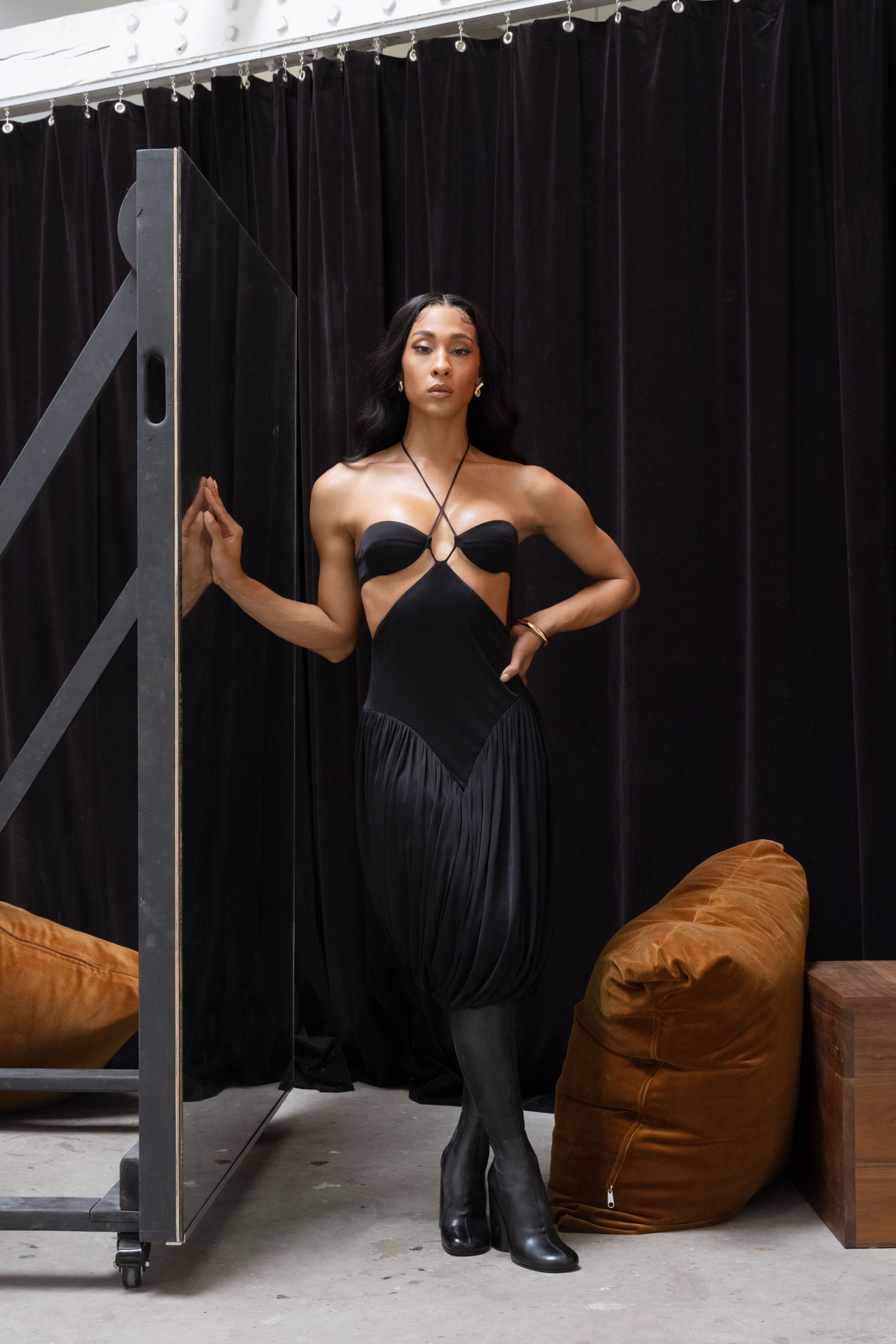
Dress by Stella McCartney. Boots by Burberry.
Throughout our conversation, Rodriguez keeps coming back to the trans community and doing right by the girls. It’s a heavy burden—one shared with her trans sisters in the industry, like Angelica Ross, the first openly trans woman to appear on Broadway, or Laverne Cox, the first openly trans woman on the cover of Time. Being the “first“ has historic ramifications but also entangles the feeling that one must perform a certain way, on and off screen, to be welcomed and accepted in the entertainment industry and society at large—mostly due to the worry of being reduced solely to a single narrative that may not encompass the breadth of trans people’s experiences.
Whatever scrutiny she may face in and out of the industry, Rodriguez is continually reminded of why she is doing it all in the first place: to inspire and be visible for younger generations of trans women. She recounts a story of a recent trip to London when a young fan approached her to share how much the actor means to her. “She said to me, ’I’m trans,’ and I said, ’What?’ As much as I have had the same thing happen to me, where people are like, ’Wait, you’re trans, what? I never knew,’ [I had that same reaction,] but not the same exact expression. I was like, ’Wow, the young ones are really thriving.’ They’re not afraid.“
Trans youth have more role models to look up to now than ever before, but they continue to face staggering challenges. “I love that [trans youth] have Laverne. I love that they have Alexandra Billings. I love that they have Alexandra Grey, Trace Lysette, Deja Smith, Mila Jam,“ Rodriguez says of the growing number of trans women in Hollywood and entertainment. I mention Anything’s Possible, a recent romantic comedy directed by her Pose costar Billy Porter starring newcomer Eva Reign in a high school love story between a trans girl and cisgender boy. “We’ve never had that before. We’ve never had an in-depth understanding of what a high schooler who is trans goes through,“ says Rodriguez, a long-time supporter of LGBTQ+ educational advocacy group GLSEN (which she has chosen as the recipient of proceeds from direct sales of this issue along with the donation of photographer Paul Mpagi Sepuya’s fee), pointing to the vital need for trans youth to have access to gender-affirming health care, including puberty blockers, and the growing amount of anti-trans legislation across the country.
Amid increasing hateful and bigoted rhetoric, careers like Rodriguez’s inherently become political by dispelling the nonsensical arguments of anti-trans punditry—without an intentional “trans agenda,“ but simply by embodying the complexity of the trans experiences on screen and living her life in the public eye.
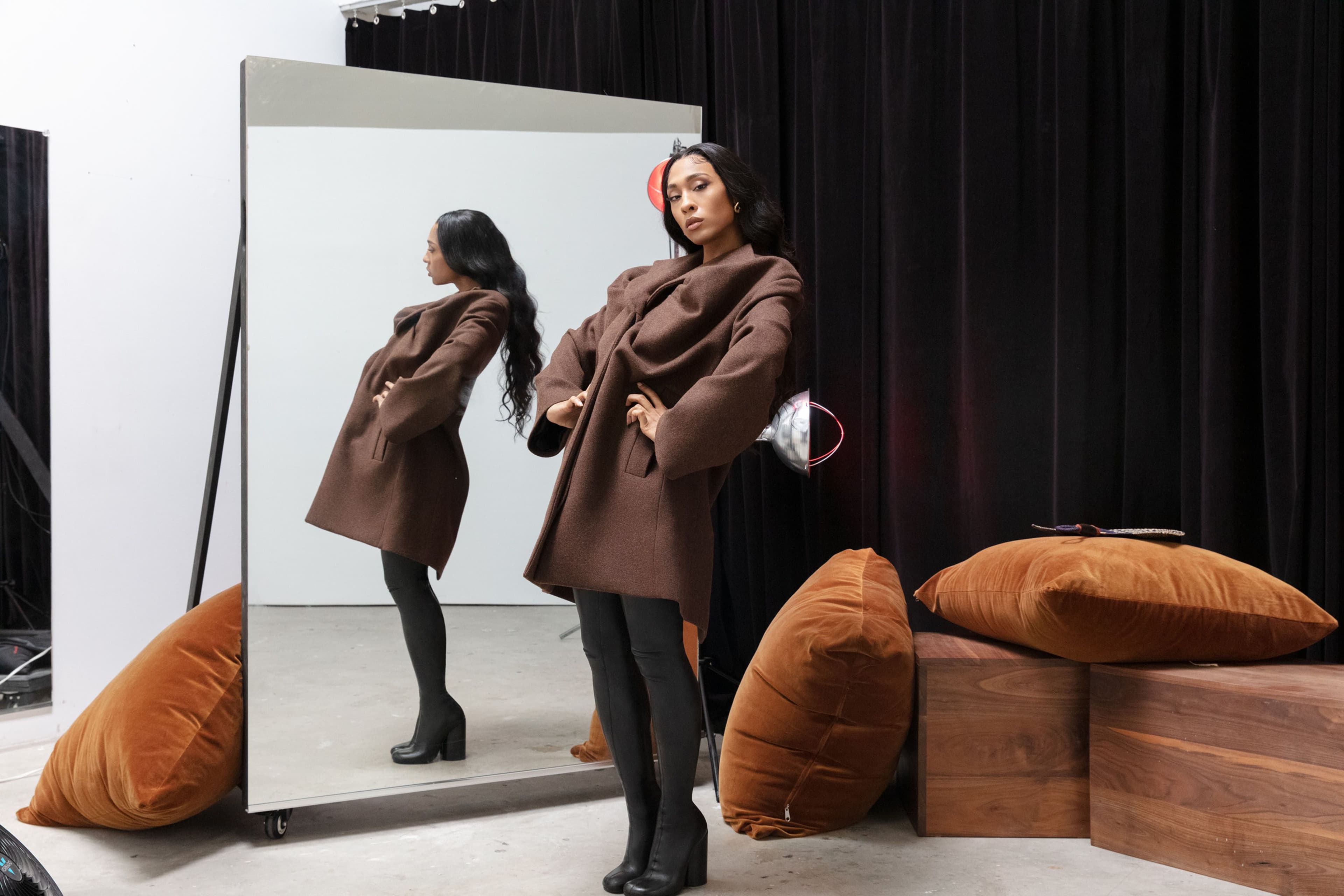
Coat by Loewe. Boots by Burberry.
As more trans people are seen in media, the goal is to place less emphasis on their gender identity, which Rodriguez and others are trying to model. When she landed her role in Loot as Sofia, who runs the foundation of Maya Rudolph’s character funded by her $87 billion divorce settlement, the showrunners asked whether she wanted her character to be identified as cisgender or transgender. She decided to make it a nonfactor, with Sofia not defined as either. (Recently, Cox also played a similar character in Netflix’s Inventing Anna.) More trans actors and roles will come, and the real trans tipping point will occur with a multitude of trans stories in media, trans actors in and out of trans-specific roles, and stories that depict real-life trans experiences that supersede stereotypes.
Two hours into our conversation, I ask Rodriguez about her love life and she lights up. “I love my boyfriend, Steven. I feel like we’re going to be together for a very long time,“ she says. “I love that he loves me publicly.“ As with the impact of her roles, she understands the importance of having a cisgender boyfriend love her out in the open. They have been together for three years; with him, she feels safe and protected.
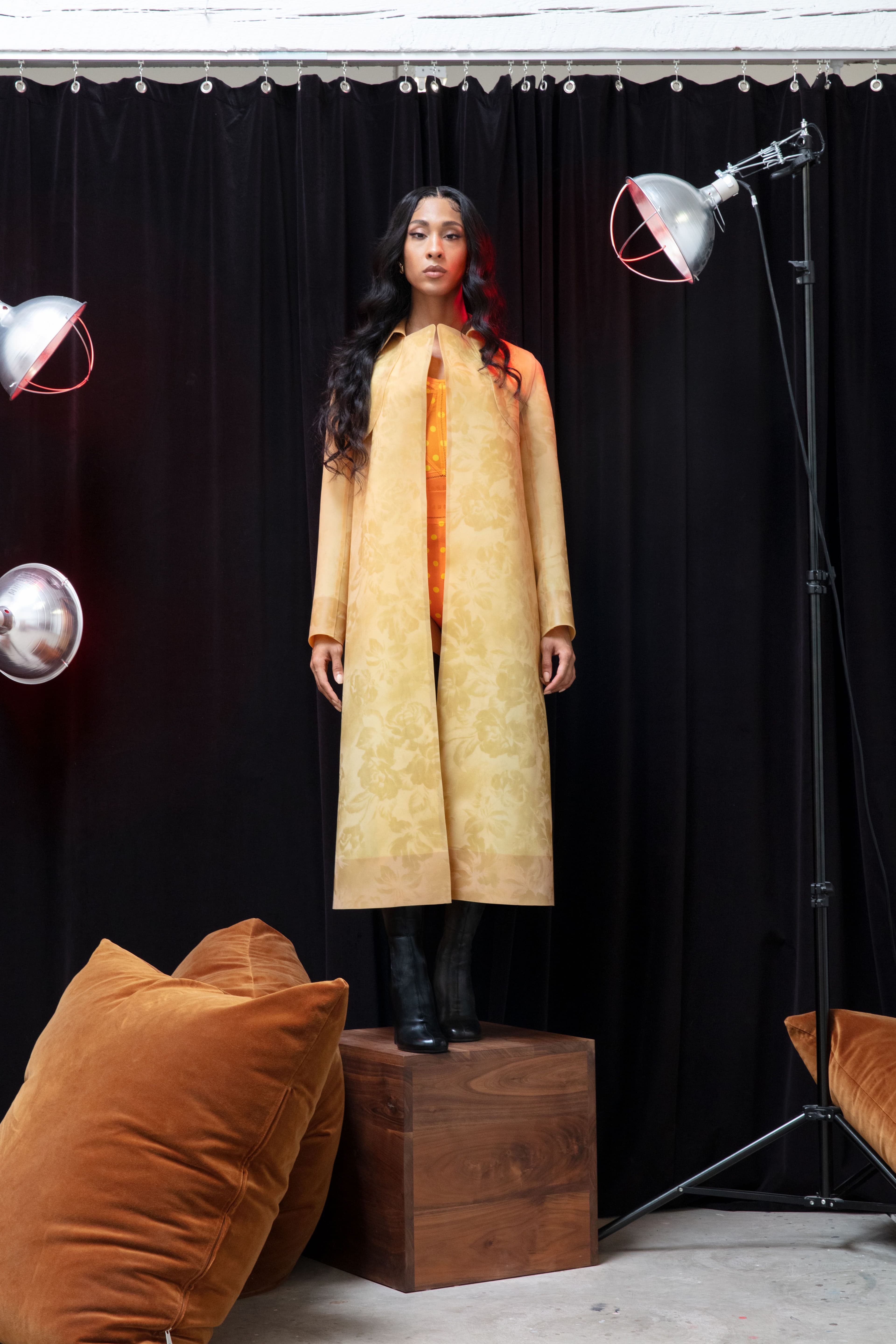
Coat by Kwaidan Editions. Top, underwear, and boots by Burberry.
The world is Rodriguez’s oyster, and she’s only just getting started. In the coming months, she’s also releasing new music, which she describes as danceable R&B-pop, but with roots and soul. “I don’t want them to just think I’m something that’s bubblegummy,“ she says. “That’s not nothing about me.“ From drama series and musicals to Loot and her upcoming debut EP, Rodriguez is only just beginning to show the world her full potential. To some in the entertainment industry, her confidence and ambition may seem like cockiness. But to me, and no doubt countless others, she is showing what it looks like when a person is given opportunities to excel and simultaneously grounds herself and lifts up her community. Rodriguez is free, as the wind on the beach, from the trans-specific box Hollywood tried but failed to place her in.
Our last round of margaritas arrived and Rodriguez had answered all of my (on- and off-the-record) questions. “Well, shall we live?“ she asked as we wrapped our interview. And we did.
Loot is now streaming on Apple TV+. Read this story and many more in print by preordering our fifth issue here. Rodriguez has selected GLSEN, which focuses on educating, protecting, and uplifting LGBTQ+ K-12 students, as the recipient of proceeds from direct sales of CERO05.
As a nonprofit arts and culture publication dedicated to educating, inspiring, and uplifting creatives, Cero Magazine depends on your donations to create stories like these. Please support our work here.
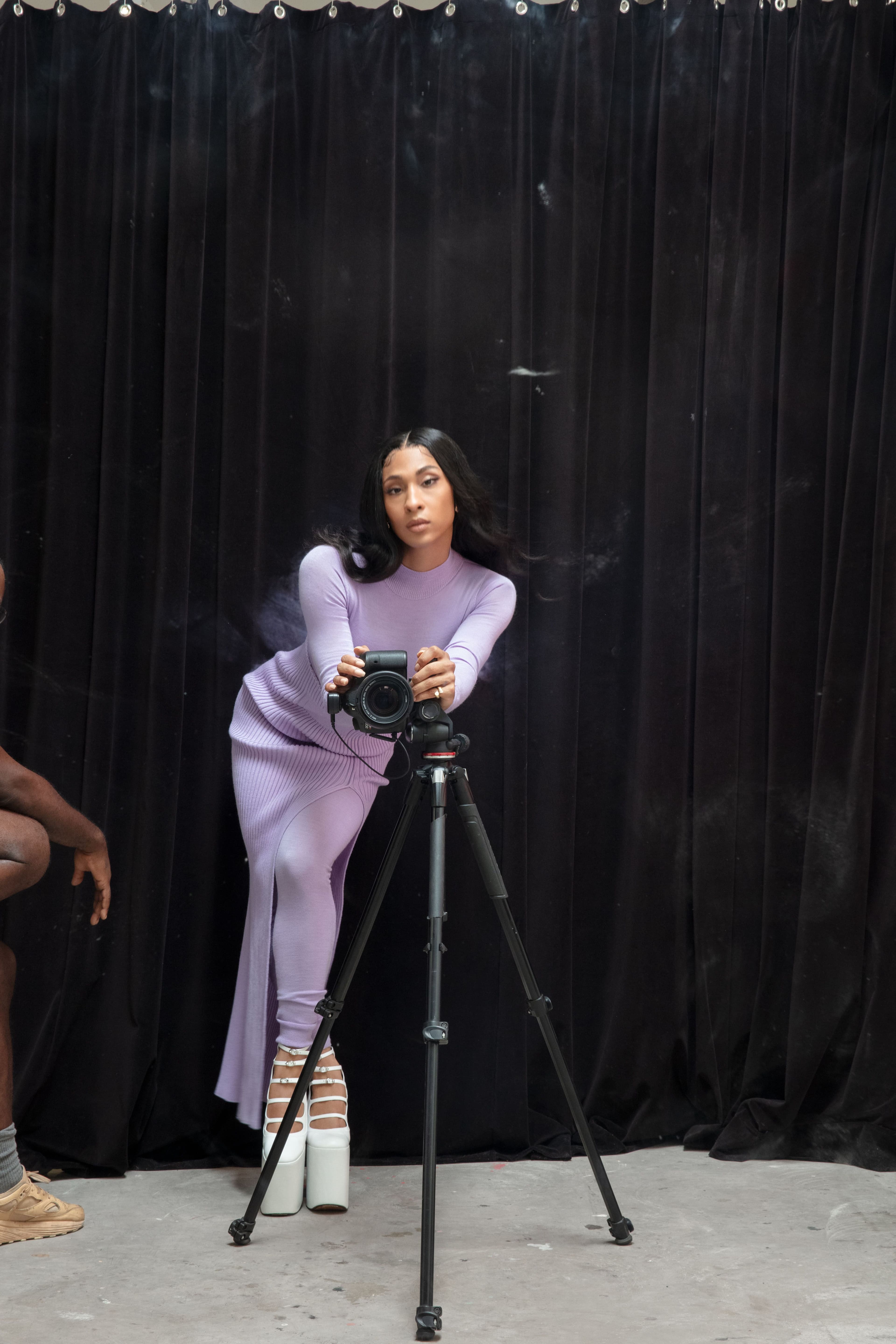
All clothing by Marc Jacobs
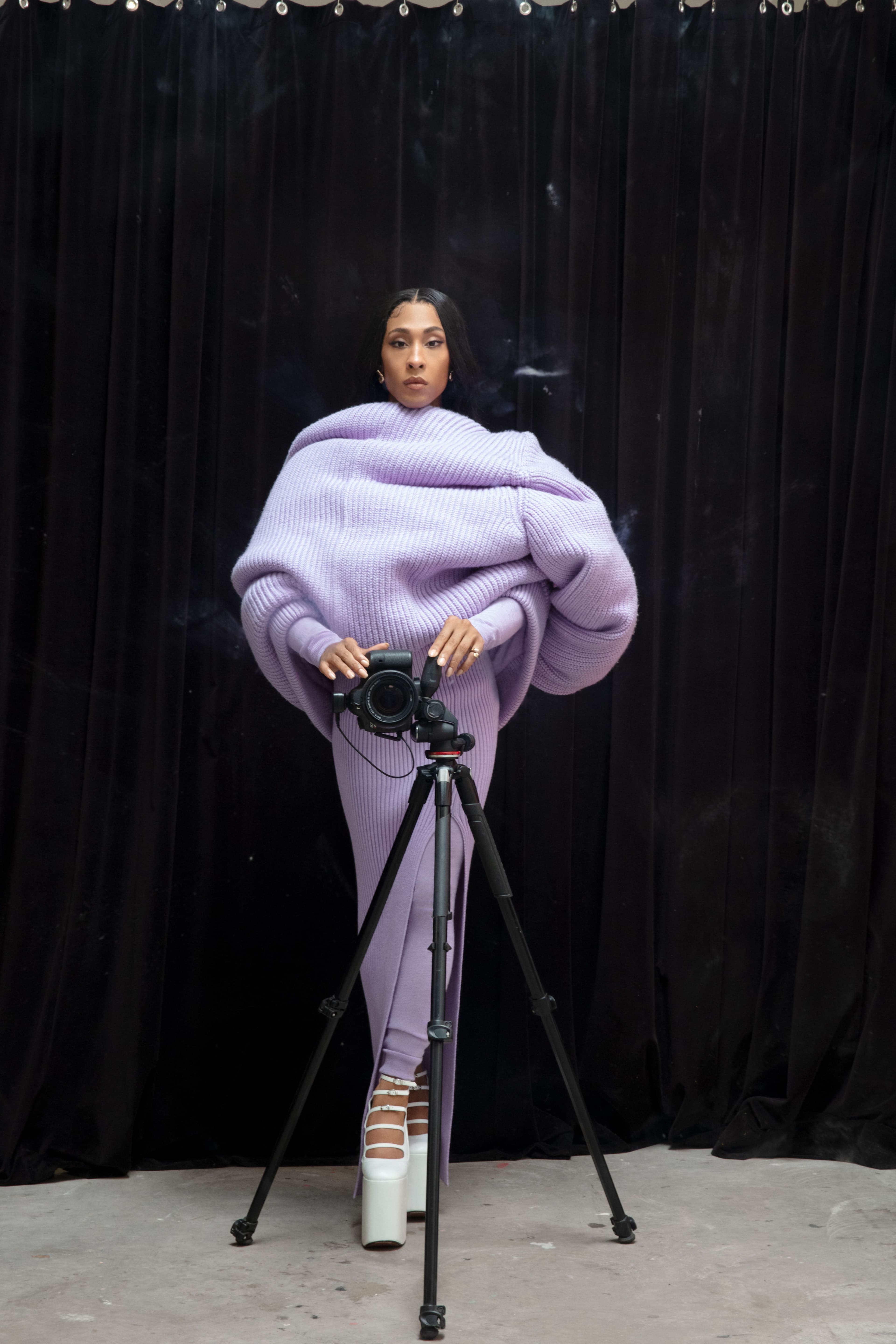
All clothing by Marc Jacobs
As a nonprofit arts and culture publication dedicated to educating, inspiring, and uplifting creatives, Cero Magazine depends on your donations to create stories like these. Please support our work here.






